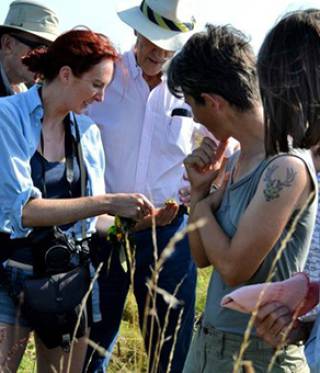Research Title
Assessing the value of pond management for biodiversity conservation
- More about Helen
Academic Background
- 2011-present University College London: PhD Assessing the value of pond management for biodiversity
- 2006-2007 University of Liverpool: MSc Restoration Ecology of Terrestrial and Aquatic Ecosystems (Distinction)
- 2003-2005 University of Birmingham in conjunction with the Field Studies Council: Certificate in Biological Recording and Species Identification
- 2000-2005 University of East Anglia: BSc Ecology with a Year in Europe (First Class Honours) studying at UAM, Spain for one year. Dissertation: The utilisation of Crassula helmsii by freshwater invertebrates in the UK.
Employment
- July - November 2010 Northwest Biodiversity Mentor, iSpot, Open University: The Wildlife Trust for Lancashire, Manchester and North Merseyside
- November 2007 - April 2010 Community Liaison Officer, Merseyside BioBank, Liverpool
- January - August 2006 Centre Manager, The Environment Eduction Centre (maternity cover)
Voluntary Posts
- Sept 2012-present Physical Geography Lunchtime Seminar Coordinator
- June2012-present European Pond Conservation Network Steering Committee (student member)
- May 2009 - Nov '10 Committee member - West Lancashire Wildlife (Field Trip Officer)
- April 2009 - Nov '10 Secretary of Merseyside and West Lancashire Bat Group
- Jan 2009 - Nov '10 Secretary of Merseyside and West Lancashire Mammal Group
- Teaching
I have been an Undergraduate Academic Tutor and taught on the following courses:
Undergraduate
- Ecological Patterns and Processes (GEOG0020): Assistance with field trip and preparation at field site
- Conservation and Environmental Management (GEOG0093)
- Introduction to Genetics (BIOL0003)
- Data Acquisition and Interpretation (GEOG1003) - Reading week field class (Slapton): Running practical field sessions in stream habitat and student support in invertebrate identification during classroom sessions
Postgraduate
- Environmental Data Acquisition and Analysis (GEOG0106)
Additionally, I have a UCL Certificate in Teaching in Higher Education (HEA accreditation)
- Publications
Journal Articles
- Davies, S.R., Sayer, C.D., Greaves, H., Siriwardena, G.M., Axmacher, J.C. (2016) A new role for pond management in farmland bird conservation. Agriculture, Ecosystems & Environment, 233:179-191
- Sayer, C.D., Shilland, E., Greaves, H., Dawson, B., Patmore, I.R., Emson, E., Alderton, E., Robinson, P., Andrews, K., Axmacher, J.A. & Wiik, E. (2013) Managing British ponds – conservation lessons from a Norfolk farm. British Wildlife, 25(1), 21-28.
- Research Interests
My research focuses on historical, agricultural marls pits which are numerous in several areas of lowland England. In agricultural regions ponds have the potential to provide hotspots and refugia for aquatic biodiversity. However, at present, the vast majority of historical marl pits are heavily terrestrialised, impacting the pond floral and faunal communities significantly.
Much debate exists regarding the appropriate ways to deal with the issue of pond terrestrialisation so as to best conserve and promote aquatic diversity across lowland landscapes. However, until now, there has been relatively little monitoring of managed and restored marl pits in this environment.
This research incorporates both a temporal and spatial monitoring programme. The aim of this study is to investigate the following key research questions:
- How does terrestrialisation and restoration affect the chemical and ecological functioning of ponds?
- How does pond management and restoration affect biological structure and species diversity?
- Can pond restoration return lost biological communities?
The results of this PhD research will hopefully contribute significantly to knowledge of freshwater biodiversity conservation and have the potential to influence agri-environment schemes in the UK and across Europe.
A simple hand-out showing the influence of pond restoration on macrophyte, Odonata and amphibian communities in one of the study sites can be downloaded below:
- Impact
Being publicly-funded through NERC for my research, it is essential to me to return the knowledge gained through my investigations to both the scientific field and the non-specialist. Throughout my funding period I have been involved in a number of outreach events including 'Science Uncovered' at the Natural History Museum, London.
I have also organised a public engagement event aimed specifically at individuals working for major organisations in the environment and conservation sector. The purpose of the day was to introduce the concept of pond restoration on agricultural land and to demonstrate that wildlife can flourish in ponds on intensively farmed agricultural land. More information on the event can be found in the link below.
 Close
Close


